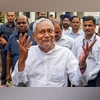The Nitish Kumar government in Bihar on Monday released findings of a caste survey which revealed that castes comprising Other Backward Class (OBC) and Extremely Backward Class (EBC) categories constituted 63 per cent of the state’s total population of over 130 million. The “Unreserved” or “General” category constituted 15.52 per cent, while Scheduled Castes accounted for 19.65 per cent.
The survey found 81.99 per cent of Bihar’s total population was Hindu, followed by 17.7 per cent Muslims.
The release of the caste survey data on the occasion of the birth anniversary of Mahatma Gandhi, two months before the Assembly polls in three Hindi heartland states — Chhattisgarh, Madhya Pradesh and Rajasthan — and six months ahead of the 2024 Lok Sabha elections, triggered renewed demands, including from the Congress, for a nationwidecaste census.
The survey could also open the door to challenging the current 50 per cent ceiling on quotas in educational institutions and jobs, and potentially reset the contours of the Mandal-Kamandal politics of the 1990s.
In the run-up to the Karnataka Assembly polls in May, the Congress had committed in its manifesto to release the caste census data conducted during the previous Siddaramaiah government (2013-18). Demand for a countrywide caste census is a crucial plank of nearly all INDIA bloc parties, except the Trinamool Congress. After Bihar, the Odisha government also ordered a caste survey.
A few hours after the Bihar government made the data public, Prime Minister Narendra Modi, at his public meeting in poll-bound Madhya Pradesh’s Gwalior, said the Opposition has played with the emotions of the poor and divided the country on caste lines for six decades -- a “sin” which it was committing now as well. The Congress is the principal Opposition to the Bharatiya Janata Party (BJP) in MP.
However, former Bihar deputy CM Sushil Modi, currently a Rajya Sabha member, said the BJP supported the caste survey, and claimed the decision to conduct the survey was taken during the Janata Dal (United)-BJP coalition government, and that the Rashtriya Janata Dal was trying to claim undue credit for it. Sushil Modi said the survey collected data on 27 counts, and not just caste status of the population, and demanded its release. Sources said the Bihar government could soon release the socio-economic data of the survey.
More From This Section
Bihar’s Development Commissioner Vivek Singh released the data in Patna in the afternoon, which backward caste politicians have demanded for decades, arguing the need to plug the empirical gap that exists in the enumeration of these castes since the 1931 census was the last comprehensive caste headcount. The Mandal recommendations for job reservation, tabled in 1980, had extrapolated the 1931 census data to estimate the backward class percentage at 52 per cent.
The survey also found that Yadavs, the OBC group to which Bihar's Deputy CM Tejashwi Yadav belongs, were the largest in terms of the population, accounting for 14.27 per cent of the total. Among upper castes, Brahmins were 3.65 per cent, Bhumihars 2.86 per cent, Rajputs 3.45 per cent, while OBC castes of Koeris (Kushwahas) were 4.2 per cent and Kurmis 2.87 per cent.
Chief Minister Nitish Kumar said: “A meeting will soon be convened of all the nine political parties with an electoral presence in the state legislature and the facts and figures will be shared with them.” RJD President Lalu Prasad said the survey will set the tone for “a nationwide caste census which will be undertaken when we form the next government at the Centre”.
“Muslim population has also been found to be 17.7 per cent (against 16.86 per cent in the 2011 census), which exposes the lie spread by Sanghi propaganda about infiltration by Bangladeshi Muslims,” CPI(ML) General Secretary Dipankar Bhattacharya said. He said the fact that the Mandal Commission estimated OBCs at 52 per cent, which had now increased by over 10 per cent, proves the need for fresh thinking on the issue. The state Cabinet gave its nod to hold a caste survey on June 2 last year and allocated Rs 500 crore for the mammoth exercise.
Earlier this month, during the special session of Parliament, Congress leader Rahul Gandhi flagged the poor representation of OBCs at the secretary-level posts in the Union government. Union Home Minister Amit Shah had said the BJP had the most OBCs among its MPs and legislators.



)
